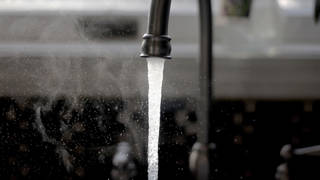
Topics
This video was produced by former Democracy Now! fellow Messiah Rhodes.
Democracy Now! was in Detroit this weekend when residents impacted by water shutoffs met with United Nations officials who are visiting to investigate possible human rights violations.
“I started to document the scene, and I said in a really strong voice, loud voice, 'You not going to shut my water off. I got kids to take care of. Call the cops if you want,'” says People’s Water Board Coalition member Valerie Blakely, a mother of four who stopped the shutoff of her water the moment the department arrived at her home in July.
Detroit has shut off water to at least 27,000 households this year as part of a consolidation plan, which residents see as a step toward privatization. Water bills in Detroit cost nearly twice the national average, while the poverty rate is 40 percent.
Two-thirds of households impacted by the water shutoffs are families with children; the children can be taken away by protective services if the house does not have water.
On Monday, the U.N. rapporteurs recommended that Detroit immediately resume service to all residents who are unable to pay their water bills.
MAUREEN TAYLOR: This United Nations team has come to Detroit and has spent three days here. They will be here three solid days. This is an opportunity to buoy our spirits, to certainly tell the community we are not wrong in this fight to demand that water remains a public trust, we’re not wrong in this fight to demand that water is never shut off, and the fact that there are people from around the globe that understand this does not in any way diminish your interpretation because you’re local. That’s L-O-C-A-L, local, not loco. You’re not loco. And I think that that’s the issue. So I think this is a spectacular moment in history. No one suspected that this would happen. And the phones are ringing. This is Sunday, and the phones are still ringing. Well, people are quite interested in this, so I think it’s a good special and a—what do they call it? A watershed moment.
PROTESTERS: Whose water? Our water! Whose water? Our water! Whose water? Our water!
VALERIE BLAKELY: I was making coffee. I heard something out front of my house. I looked out the window, and I saw it was a very large, big red Homrich truck. I knew that Homrich was the company that had been hired to do the Detroit water shutoffs, so I immediately realized that I was going to get my water shut off. I grabbed my phone and my camera, and I rushed down the stairs. And outside on my porch, the second I hit my porch, I started documenting the scene. And I said in a really, really strong voice, a loud voice, that “You’re not going to shut my water off today. I’ve got kids to take care of. Call the cops if you want.”
COLETTA ESTES: When they failed to hire new employees, when they eliminated the collection people that would go out and try and collect and the people that would do the shutoffs, they downsized them, so then people were accumulating huge water bills. So there’s a large responsibility that is with the city and the department itself. They need to come up with a way to make this right.
DEMEEKO WILLIAMS: The water department made up a story saying that there were threats of a blockade against the payment centers, and that was totally unfounded. This had been happening for a very long time. Go to any payment center on a normal workday, and you would see armed guards with wands and long lines of people, you know, trying to get in to settle their situations, and they’re being intimidated.
CECILY McCLELLAN: I would ask the U.N. to demand that the citizens of Detroit, Highland Park or this region not be treated like noncitizens or Detroit not be treated like a Third World, in that they demand that everyone put a moratorium on water shutoffs.
PROTESTERS: Whose water? Our water! Whose water? Our water! Whose water? Our water! Whose water? Our water! Whose water? Our water!











Media Options